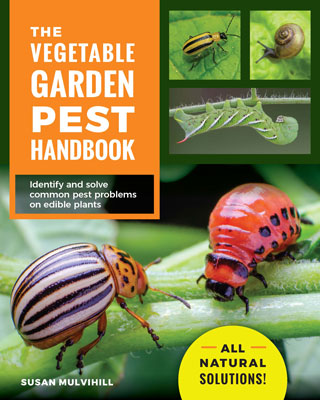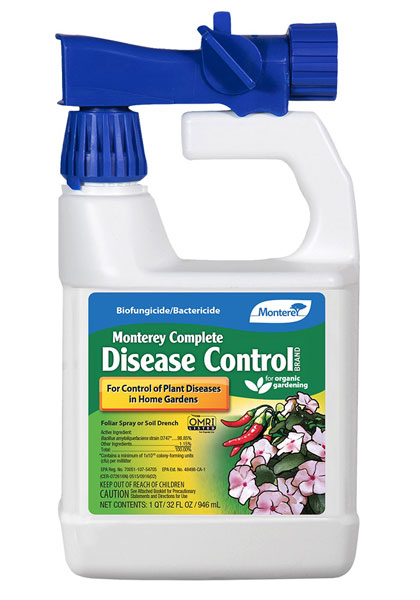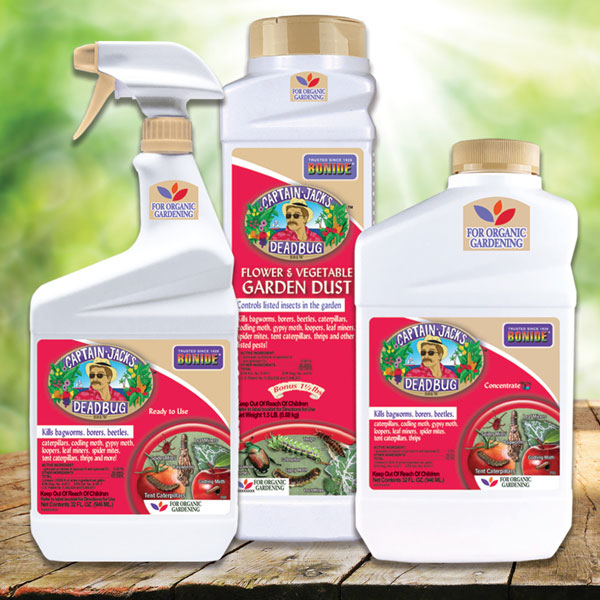4/1/2021
Dig a Little Deeper
Jennifer Polanz
We all know there are certain keys to successfully growing a plant. Starting with a great plant and improved genetics, retailers also can help improve a customer’s success with information about watering, soil health, right plant, right place and fertilizer tips (as in, yes, you do need to buy fertilizer for the plant).
But what happens when all that goes sideways, and pests and diseases move in on your customers’ latest purchases? Then it gets trickier—they certainly don’t want that cabbage looper on their cabbage (ew!), but consumers are more cognizant than ever that what they spray may impact other beneficial bugs in their garden.
 “Pictured: The Vegetable Garden Pest Handbook”
“Pictured: The Vegetable Garden Pest Handbook”
Looking for a book to help customers through the wide world of pest control in veggie gardens? Quarto has a brand-new book coming out later this month (April 20) called “The Vegetable Garden Pest Handbook” by Susan Mulvihill. The book provides detailed information on pests, as well as easy-to-use charts for readers to identify common vegetable garden pests based on the damage they leave behind and their physical appearance.
That’s where retailers, suppliers and local extension can step in to provide some guidance, says Isabel Branstrom, a consumer horticulture educator with Michigan State University Extension. She started with MSU Extension in January 2020 and saw firsthand the meteoric rise in gardening interest while answering consumer questions through the Ask Extension website and toll-free hotline. I asked her about the questions she received most often and whether she could discern any trends.
“We keep a database, so I looked at my calls from last year,” she says. “A lot of people call about trees and shrubs, and they always correspond with climate and environment conditions, like a droughty period. People who recently transplanted trees and shrubs were seeing transplant shock and disease symptoms from trees suffering from drought.”
Because of that, she talks about right plant, right place, watering and maintenance, and how that can give a plant a healthy immune system from the start.
“We talk about planting in the right place where it’s going to do well, so if an insect is going to come in, it’s going to be able to tolerate that damage to a certain extent,” she adds.
Digging Deeper
Isabel says she asks a series of standard questions when answering pest and disease problems, like where is it planted, what kind of maintenance have you done (i.e. watering, fertilizing) and what does it look like now. She asks for digital images to better identify the problem.
Clayton Smith, horticulturist for Monterey Lawn & Garden, a manufacturer of pest and disease products, says that’s the right tack.
“We have to ask more questions. There’s underlying problems that could be causing that pest or disease problem,” he says, mirroring Isabel’s take of asking about location, lighting, watering and fertilizing. “One, it shows concern to the customer and they’re going to come back to your nursery. That’s the one thing I tell all my retailers is to ask more questions.”
There’s a reason that pest or disease is there in the first place, Clayton says, and it’s more beneficial to find the underlying reason why the issue is happening and fix that, along with treating for the pest or disease. He adds retailers can source information from manufacturer and distributor reps to help provide pest and disease education. “Ask your suppliers. We train distributors—that’s really important,” he says.
 Pictured: The new Complete Disease Control product from Monterey Lawn & Garden is a biological disease control with Bacillus thuringiensis (Bt) as its active ingredient.
Pictured: The new Complete Disease Control product from Monterey Lawn & Garden is a biological disease control with Bacillus thuringiensis (Bt) as its active ingredient.
Many suppliers, like longtime pest and disease control manufacturer Bonide, have resources available on their website for both retailers and the end consumer. Terri Wright, central regional manager at Bonide, says their company also does a lot of training for retailers and now has a library of online training videos available on the website.
“We always had that for those who couldn’t come to the PK meeting; garden center staff could watch and learn just like people who attended the training meetings,” Terri says. “Now those have become even more important in the last year because we weren’t able to train people in-person.”
Bonide has a consumer group in the office that answers consumer questions via phone and email, and has revamped the website to be more consumer-friendly, and geared toward common questions and solutions, including the ability to sort for products approved for organic use (more on that in a minute). They also have POP material like laminated insect, weed and disease charts featuring photos of the problems and the corresponding Bonide solution that are available to retailers.
“We have a lot of marketing materials to use in-store to help consumers make the right selections,” she adds.
A Shift to Natural & Biological Controls
There’s a definite trend toward biological, natural and organic pest and disease controls, and that likely will only continue as these formulations become more effective over a wider range of issues. According to the editors of the website HomeGardenandHomestead.com, one of the Top 3 trends for 2021 is biological pest control. The example they offer is Bt or Bacillus thuringiensis. Monterey Lawn & Garden has introduced a new Bt-based product called Complete Disease Control and Clayton says they’re seeing a huge demand for it already.
Clayton says he’s been in the industry since he worked loading up cars at a nursery in high school and has found a remarkable shift taking place with new formulations.
“We’re going to see that trend move even further in the future,” he says of the biologicals and natural formulations. “There are going to be some new biologicals coming out and that’s exciting. The industry is changing—that’s where the industry is going.”
 Pictured: Captain Jack’s Dead Bug Brew is a popular Spinosad-based pest control from Bonide that’s approved for organic gardening.
Pictured: Captain Jack’s Dead Bug Brew is a popular Spinosad-based pest control from Bonide that’s approved for organic gardening.
He’s quick to note, though, that synthetics aren’t bad and they’re very much needed in some cases, particularly where biological and natural or organic products aren’t yet effective. He’s also quick to point out that in many cases organic products are more UV-sensitive, so retailers should communicate to consumers to apply them more frequently to be successful.
At Bonide, the demand for products approved for organic use continues to grow and they’ve continued to add to their offerings in this range. One of the most popular is Captain Jack’s Dead Bug Brew, a Spinosad-based pest control that stands out thanks to its fun branding and ability to knock down a wide range of insects, including bagworms, borers, beetles and caterpillars, as well as leaf miners, spider mites and thrips. The company also offers products like Copper Fungicide, Neem Oil and Insecticidal Soaps, among many others, that appeal to natural and organic gardeners.
“We’re seeing a trend toward natural and organic products more than ever before,” Terri says, adding the growth is across all types of gardening, from edibles and ornamentals to indoor houseplants. “I see the same interest with natural products even with houseplant care.”
The Label is Law
Whether it’s organic, natural, synthetic or biological, it’s all got a label, and as Isabel tells the consumers who call her, the label is law.
“I explain everything you need to know will be on those labels, which I’m not entirely sure people know,” she said. “All the information about application, how long it’s going to hang around, when to apply—the label has everything you need to know.”
An important aspect to note, too, is sometimes labels change, so it’s always important for consumers (and anyone applying these products) to read the label even if it’s a product they’ve used for years.
There are some products that lend themselves to multiple uses and greater success rates for newbies. One of those is the aforementioned Neem Oil from Bonide, a multi-purpose insecticide, miticide and fungicide for organic gardening.
On the Monterey Lawn & Garden side, it’s the Takedown Garden Spray product, which is an organic formulation that features quick takedown for a wide variety of pests for ornamentals, edibles and houseplants.
Clayton notes, too, that consumers he talks to are concerned about the products they’re using and how to use them to impact the bugs they want to kill while not impacting beneficials like bees and butterflies. It’s a tricky tightrope to walk. That’s why it’s vital to ask them more questions to make sure you’re recommending the right product.
“Of all the areas in the store, this is probably the most confusing,” he says of the pest and disease control aisles. “I want the customer to walk out with the right product for the right plant at the right time.” GP